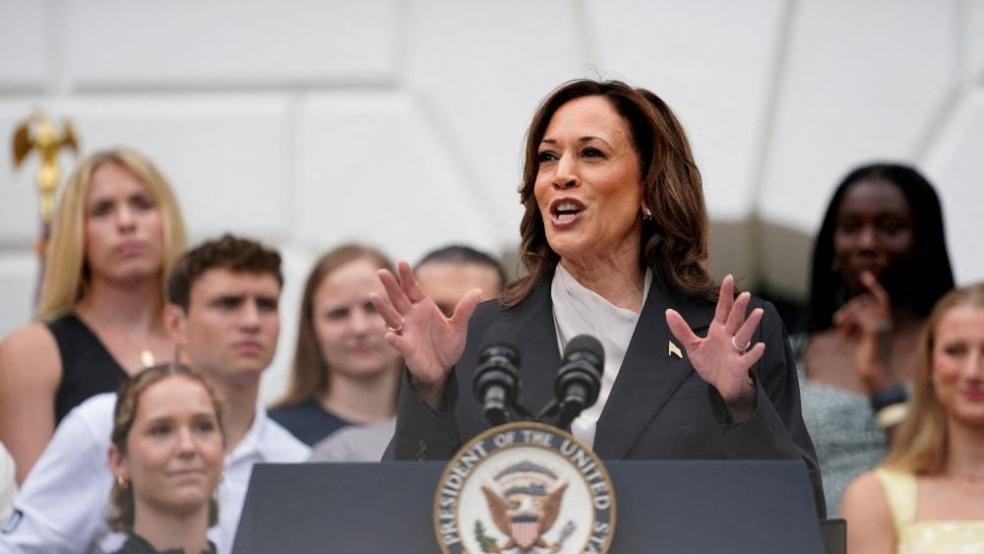As she prepares to release her economic policy platform later this week, Vice President Kamala Harris is borrowing a page from her rival’s playbook, announcing at a campaign rally in Las Vegas on Saturday that she endorses the idea of exempting tips and gratuities from federal income taxes.
Speaking to a capacity crowd that included members of the Culinary Workers Union, which represents thousands of service industry workers who rely on tips for a substantial part of their incomes, Harris said she also wants to raise the federal minimum wage.
“It is my promise to everyone here when I am president, we will continue our fighting for working families of America, including to raise the minimum wage and eliminate taxes on tips for service and hospitality workers,” she said.
The White House backed Harris’s proposal Monday, with Press Secretary Karine Jean-Pierre telling reporters that President Joe Biden would “absolutely” sign legislation to eliminate taxes on tipped wages and raise the minimum wage.
Echoing Trump: In an appearance in Las Vegas in June, former president and current Republican nominee Donald Trump raised the issue for the first time, having reportedly gotten the idea from a waitress in the gambling mecca. “When I get to office, we are going to not charge taxes on tips,” Trump said at a campaign rally. “We’re going to do that right away, first thing in office because it’s been a point of contention for years and years and years and you do a great job of service.”
Over the weekend, Trump angrily accused Harris of “stealing” his idea. “Kamala Harris, whose ‘Honeymoon’ period is ENDING, and is starting to get hammered in the Polls, just copied my NO TAXES ON TIPS Policy,” Trump wrote on his social media platform. “The difference is, she won’t do it, she just wants it for Political Purposes! This was a TRUMP idea - She has no ideas, she can only steal from me.”
Trump’s initial proposal was rejected by the local culinary union, which denounced what it described as “wild campaign promises from a convicted felon.” The same union officially endorsed Harris last week, before she publicly expressed support for the elimination of taxes on tips.
Policy questions abound: Eliminating federal income taxes on tips and raising the federal minimum wage would require new legislation and congressional approval. That legislation would need to address some thorny issues, such as how to handle what could be an avalanche of adjustments in the way people are paid. Skeptics say that if tips are made exempt from taxes, some highly paid workers such as hedge fund managers and stockbrokers will suddenly arrange to be paid in tips, at least as far as the IRS is concerned.
A Harris spokesperson said the Democratic nominee would ensure that high-income workers do not benefit. “As President, she would work with Congress to craft a proposal that comes with an income limit and with strict requirements to prevent hedge fund managers and lawyers from structuring their compensation in ways to try to take advantage of the policy,” the spokesperson said in a statement.
The fiscal cost of eliminating taxes on tips is also a potential problem. An analysis by the Committee for a Responsible Federal Budget found that Trump’s proposal would cost between $150 billion and $250 billion over 10 years. An updated analysis released Monday that includes an increase in the minimum wage found that the Harris plan would cost between $100 billion and $200 billion over 10 years, though that estimate could rise if tipping behavior changes substantially, and much depends on how exactly the policies are rolled out.
A bump for Harris: Even before offering a full suite of economic policy proposals, public perceptions of Harris’s abilities appear to be improving. A new poll conducted August 1-5 by the Financial Times and the University of Michigan Ross School of Business shows that more Americans trust Harris to handle the economy than Trump — the first time the Democratic nominee has led on that issue in monthly data going back to February.
The poll may highlight Biden’s weakness as a candidate more than Harris’s strength, but the results suggest that more voters are willing to consider her as an alternative to Trump. Still, Trump maintains an advantage on some economic issues. Most poll respondents reported a negative view of the economy, and more said they thought they would be better off under a Trump presidency than a Harris one.
Differing on the Fed: As part of his campaign to convince Americans that he is the stronger candidate on economic matters, Trump said last week that he would like to help the Federal Reserve manage monetary policy, contradicting a longstanding prohibition on political interference with the central bank. “I think that in my case, I made a lot of money, I was very successful, and I think I have a better instinct than, in many cases, people that would be on the Federal Reserve or the chairman,” Trump told reporters at a press conference in Florida.
Trump’s running mate, Sen. JD Vance of Ohio, endorsed the idea over the weekend. “President Trump is saying I think something that’s really important and actually profound, which is that the political leadership of this country should have more say over the monetary policy of this country,” he said. “I agree with him.”
Harris made it clear that she had no intention of copying this page from the Trump playbook. “I couldn’t ... disagree more strongly,” Harris told reporters in Arizona. “The Fed is an independent entity, and as president, I would never interfere in the decisions that the Fed makes.”
Taxes
Borrowing From Trump, Harris Endorses Eliminating Taxes on Tips

Reuters



